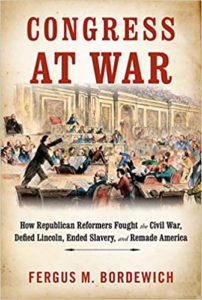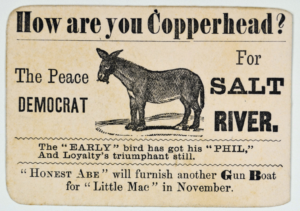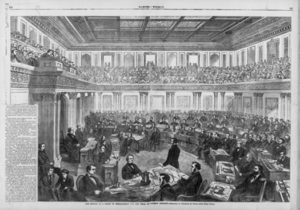![]()
![]()
![]()
![]()
![]()
Congress at War: How Republican Reformers Fought the Civil War, Defied Lincoln, Ended Slavery, and Remade America, by Fergus M. Bordewich (Knopf, February 2020)

I love to read and always have two or three books in progress at any given time. Eventually, one book will win out and will get all the attention until it is finished. Congress at War was that book. Now let me handle the disclaimers first. I know the author, Fergus M. Bordewich, and he is a member of the BGES. I also have read some of his other works, and he has been a principal on one of our tours. Having said that, if his work didn’t win the battle, I wouldn’t be writing about it. It is, in a word, “Damned Good”! (Okay, two words.)
What makes a “Damned Good” book? Well, first you have to have a thought-provoking and controversial subject. You have to catch the potential reader’s attention. Congress at War does that, but then the tagline of the book pulls you in—“How Republican Reformers Fought the Civil War, Defied Lincoln, Ended Slavery and Remade America!” I had read a previous work by Fergus—Bound For Canaan: The Underground Railroad and the War for the Soul of America. It, too, was “Damned Good.” So I had a bias to work with. Fortunately, the author’s work needs no such crutch.
Congress at War steps out of the shadow that was Lincoln and his administration and sets up the foil and, indeed, the paradox of our democracy that is the co-equal branches of government. With Lincoln’s election and the dissolution of the Democrat party with the southern states, the task was made a good deal easier even if the problems presented were not. Given the watering down of the opposition, both in numbers and philosophical differences, it is no wonder that so many groundbreaking initiatives were passed. Whether it was the trans-continental railroad, or amendments to the Constitution, revenue taxation, a national currency, or Western land grants, the pace of social change was dizzying.

The author masterfully weaves the various legislative actions into a page-turning narrative. While there are military actions of consequence, we see them through the eyes of the oversight committees set up to monitor loyalty and performance. We get detailed looks at the Radical Republicans and the Copperhead Democrats. I was particularly interested in the evolution and ascent of Senator Pit Fessenden. I learned much about the nature of Charles Sumner and found new appreciation for Thaddeus Stevens. Salmon Chase, like Lincoln, I could do without him. Wade, Chandler interesting and informative.
In opposition we find several border state politicians who hold the course on the preservation of slavery even though the pressure is clearly on to maximize the impact of the confiscation acts on the Confederates’ war effort. The humanization of the blacks seems an afterthought in a world filled with racism and racist sentiments. The practical effect of these debates does not take full effect until the end of the war, and the question of reconstruction, assimilation, and political power arises. These and many other meaty questions are raised, debated, and answered. All in an engaging and cogent fashion.
If I had any complaints with the book, and they are minor in the overall context, it would be that the military history in several instances is garbled, inaccurate, and interpreted on a macro level when there were nuances that were not introduced. For example, the Fort Pillow Massacre has been controversial over many years and still is today. The interpretation Fergus puts forth is unyielding and unbalanced. In the political context of the time, it was an important opportunity at a key time in the politics of the nation to “Wave the Bloody Shirt.” However, some 155 years afterward, a few balanced comments recognizing the controversy over the interpretation would have been welcomed.

Another aspect of the book that turned it a bit for me was the summary chapter. In it some personal bias appeared to climb into the conclusions. Perhaps knowing the nature of the conflicts currently between Congress and the Executive Branch, I was both enlightened in the discussion of the impeachment of Andrew Johnson and the similarities just witnessed in the impeachment of Donald Trump. The problem is more likely mine, but I think some personal bias entered into Fergus’s summary. He is the author, and he is entitled. It did not adversely impact the educational and entertainment punch he delivered. This was 16 or so hours very well spent, and for that I say—thank you.
My biggest takeaway was a desire to crack the cover of my nine-volume set on the Reports of Committee on the Conduct of the War. Years ago I read Bruce Tap’s fine book Over Lincoln’s Shoulder, but now I want to read the actual investigations. Bravo to you, Fergus.
You must be logged in to post a comment.